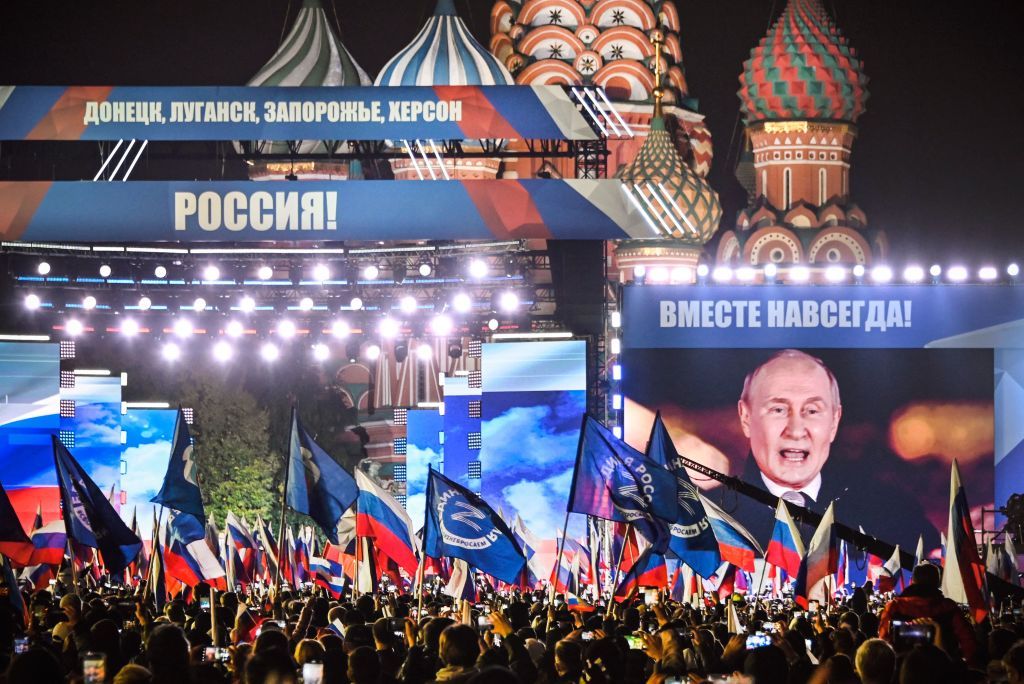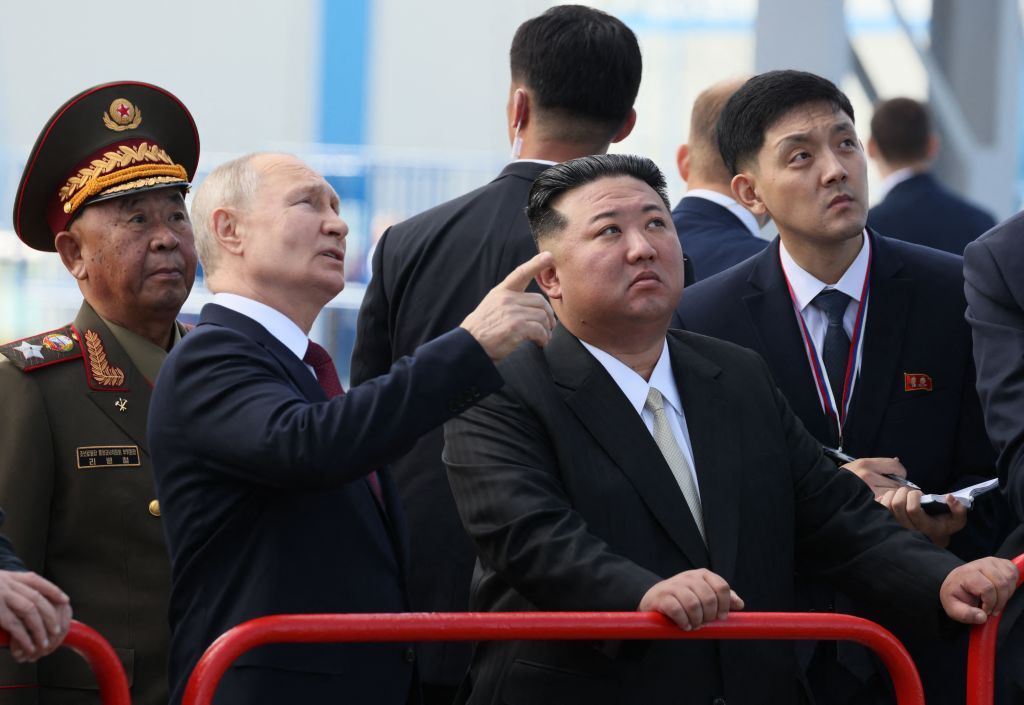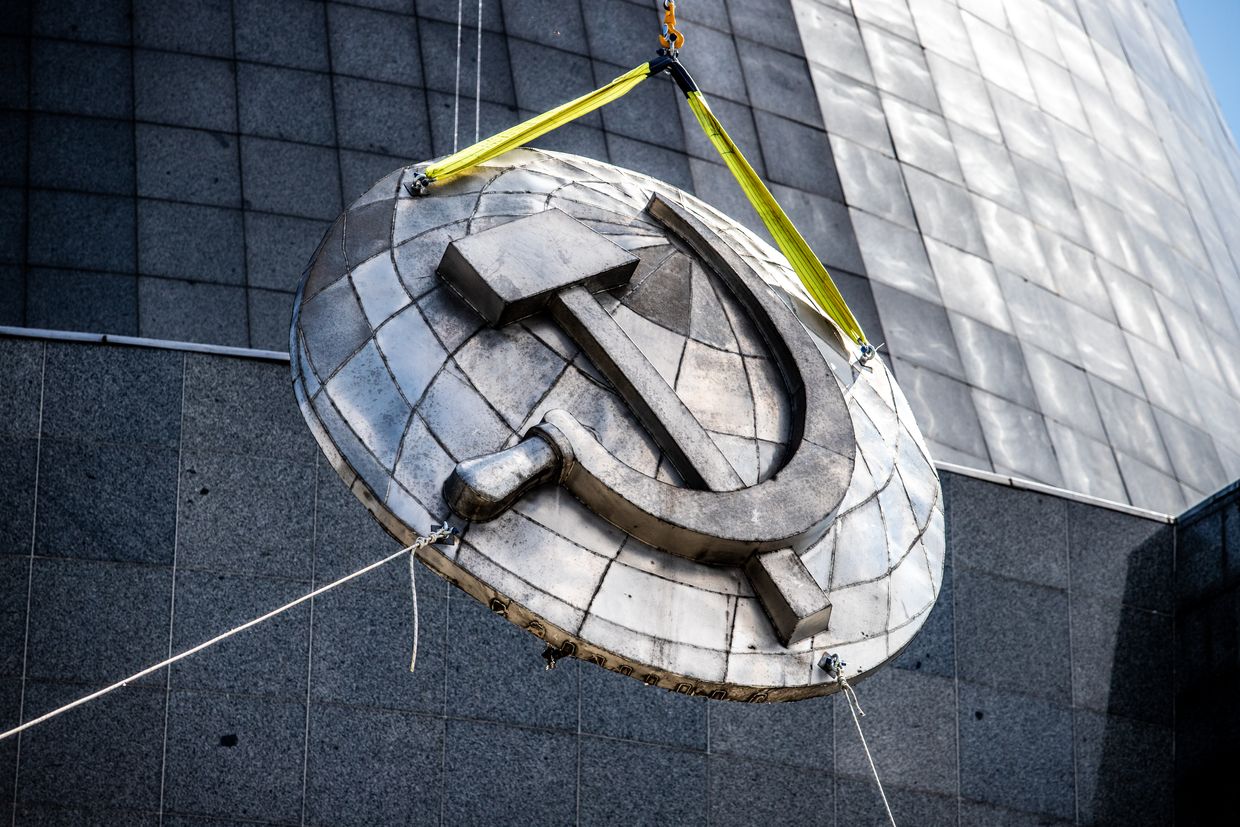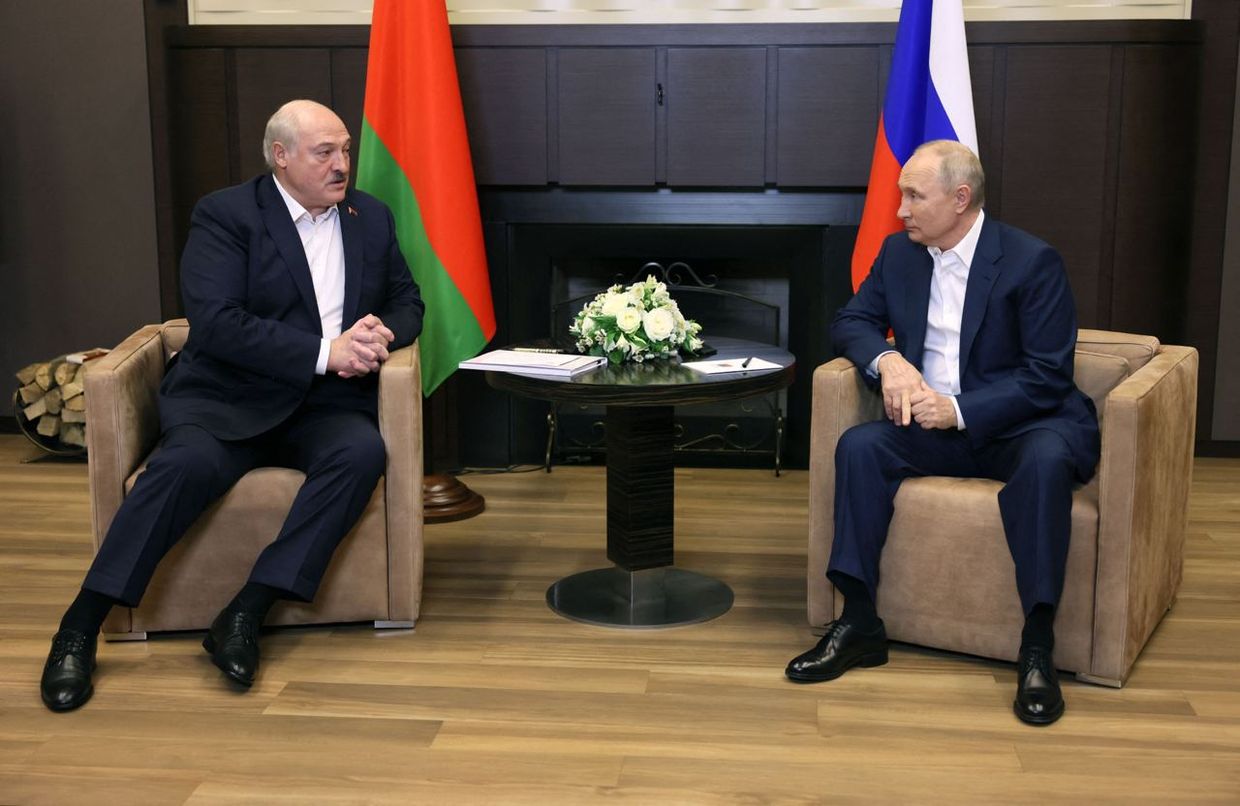Lukashenko proposes creating a trilateral partnership with Russia and North Korea during his meeting with Putin in Sochi.
Forty-eight Ukrainian children abducted from Russian-occupied parts of Ukraine arrive in Belarus.
Latvia closes one of its border crossings with Belarus due to “the most tense situation since 2021” amid the Minsk-engineered migrant crisis.
Investigation reveals Lukashenko’s latest super-mansion cost over $14 million
A former Belarusian “death squad” member confesses to taking part in the disappearances of three Belarusian opposition politicians in the late 90’s. Human rights activists herald the trial as “historic.”
Lukashenko proposes trilateral partnership with Russia, North Korea
Belarusian dictator Alexander Lukashenko expressed interest in creating a three-way partnership with Russia and North Korea during his meeting with Russian President Vladimir Putin in Sochi, Russia, on Sept. 15.
Lukashenko and Putin met in the Black Sea resort city to discuss bilateral relations and further integration into the so-called Union State amid their growing isolation.
“I think that we can think about trilateral cooperation. North Korea, Russia … I know that Koreans have a great interest in cooperation with Russia,” Lukashenko said. “I think there will be some work for Belarus. Taking into account the problems that exist.”
The meeting took place two days after Putin met with North Korean dictator Kim Jong Un in the Vostochny Cosmodrome in Russia’s Amur Oblast. Rumors of an arms deal between the two leaders have circulated, although the Kremlin denies the claims.

Kim’s itinerary in Russia on Sept. 13 included a tour of a Russian fighter jet factory and Russia’s Pacific fleet. When asked whether Russia would help North Korea “launch its own satellites and rockets,” Putin responded: “That’s exactly why we came here.”
“Korea is our neighbor, and we must build good neighborly relations with our neighbors one way or another,” Putin said after his talks with Lukashenko.
While Lukashenko did not disclose the details of his talks with Putin in Sochi, the dictator said the visit focused on defense and security.
“Ukraine is only the beginning. We may see worse things if we don’t mobilize and don’t show them that we can retaliate as well,” Lukashenko said.
“We and Russia are most of all concerned about Poland. And America stands behind Poland. … In 2020, they wanted to merge Belarus with Poland and make us a dividing line between Russia, the East, and the West,” Lukashenko claimed.
Tensions between Belarus and its EU neighbors have increased since the beginning of Russia’s full-scale war. Minsk continues to make false claims that Warsaw has so-called “expansionist aims” East.
Putin’s meeting with Lukashenko was their seventh this year.
Although Lukashenko has thus far refrained from sending his own troops to fight alongside Russian forces in Ukraine, his regime continues to assist Moscow in its war.

Nearly 50 Ukrainian children stolen from Russian-occupied territories arrive in Belarus
Forty-eight Ukrainian children forcibly removed from Russian-occupied parts of Ukraine arrived in Belarus on Sept. 18, Belarusian state media claimed.
The children, taken from the occupied parts of Ukraine’s Donetsk, Luhansk, and Zaporizhzhia oblasts, have reportedly been relocated for so-called “recreational programs,” a term falsely employed by both Moscow and Minsk to justify their abductions.
According to Belarusian media, the children will be hosted in Navapolatsk, a city in Belarus’ northern Vitsebsk region.
The children were removed from Ukraine by a Belarusian charity led by Alexei Talai, who claimed that Belarusians want to help “children from dilapidated cities and towns in the new territories of Russia.”
Belarusian authorities have themselves confirmed hosting over 1,000 children from Russian-occupied parts of Ukraine.
According to official estimates, Russia has abducted over 20,000 children from Russian-occupied parts of Ukraine, although the actual number is likely much higher.
The International Criminal Court (ICC) issued an arrest warrant for Putin and Russian Children’s Rights Commissioner Maria Lvova-Belova for organizing the illegal transfers.
The European Parliament called on the ICC in mid-September to issue an arrest warrant against Lukashenko for his complicity in the crime.
The head of the Red Cross’ Belarusian branch, Dzmitryi Shautsou, has also confirmed his organization’s involvement in the abduction of Ukrainian children.
Last week, the International Federation of Red Cross and Red Crescent Societies recommended he step down until the investigation into his support for Russia’s war is concluded.
Latvia closes border crossing point with Belarus
Latvia announced on Sept. 19 that it will close one of its two border crossing points with Belarus due to the ongoing Minsk-engineered migrant crisis.
Latvia has suspended the operation of its Silene border crossing point, while its second checkpoint with Belarus, Patarnieki, will remain open for freight transport, urgent humanitarian movement, and emergencies.
In retaliation against growing Western sanctions, Minsk engineered a migrant crisis at its borders with Latvia, Lithuania, and Poland starting in 2021. Belarus funneled thousands of migrants from the Middle East and Africa to its borders under the false promise of easy asylum in the EU.
On Sept. 10 alone, Latvia prevented 246 people from illegally crossing into the country from Belarus – a 24-hour record. The Latvian Border Guard said it has recorded 1,773 illegal crossings in September thus far.
This year, the total number of attempted illegal border crossings into the EU from Belarus stands at 7,800.
“Border tensions are increasing, and Belarus is engaging more and more in such a hybrid threat, that we have an increasing number of illegal travelers,” Latvian Prime Minister Evika Silina said.
According to Latvian Interior Minister Rihards Kozlovskis, closing the Silene crossing allows border guards to be redeployed to key areas at the border.
In late August, Poland and the Baltic states threatened to shut their borders with Belarus completely should there be either an armed incident or a “mass breakthrough of migrants” at one of their borders.
Meanwhile, Lithuania closed two of its border crossings into Belarus on Aug. 18, citing a changing geopolitical situation, smuggling, and threats to national security.
The crisis has also prompted all three neighboring EU countries to build physical barriers at their borders with Belarus.

Investigation: Minsk spent over $14 million on Lukashenko’s latest residence
Belarus has spent over $14 million on the latest of Lukashenko’s opulent residences, according to an investigation by BelPol, a group of former Belarusian law enforcement officers opposed to Lukashenko’s rule.
The investigation suggests that a four-story building that formerly housed a medical institution and is situated close to the presidential office in Minsk is being converted into a luxurious home for the Belarusian dictator.
According to the investigation, the luxurious pad hosts everything from a spa and massage rooms to conference rooms and a dining room adorned with stained glass windows.
Lukashenko has 17 known residences across Belarus.
Ex-Belarusian ‘death squad’ member confesses to kidnapping opposition figures
Yury Harauski, a former member of Lukashenko’s special security forces known as the “death squad,” confessed to taking part in the forced disappearances of three Belarusian opposition figures in the 1990s.
Harauski offered his apologies to the families of former Interior Minister Yury Zakharanka, former Deputy Prime Minister Viktar Hanchar, and businessman Anatoly Krasouski, who disappeared between May and September 1999.
According to Harauski, Zakharanka was kidnapped on May 7, 1999. He was driven to a military base outside Minsk and then shot by his superior, a lieutenant colonel who headed the “death squad.”
Hanchar and Krasouski were kidnapped in September 1999 as they were leaving the sauna in Minsk. Harauski said they were shot “execution style” by the same man who killed Zakharanka.
Harauski claimed he was not aware of his superiors’ intentions to kill the three men, adding that he broke Hanchar’s nose to leave evidence for a future investigation.
During an interview with Deutsche Welle in 2019, Harauski publicly confessed to his involvement in the so-called “death squad,” which he says arranged the disappearances.
However, he claims not to have participated in the murders.
Harauski sought asylum in Switzerland in 2018, settling in St. Gallen, where the trial took place.
Attempts by the victims’ families to obtain information from Belarusian authorities about their whereabouts have been blocked, and Lukashenko has denied any involvement in the disappearances.
“Any result (of the trial) shows the capabilities of the system of universal jurisdiction,” Hanchar’s former lawyer, Pavel Sapelka, said, adding that a guilty verdict would be a “big step” toward a decisive trial for those who executed the murders.
The last Free Theater
The Belarus Free Theater (BFT) is an underground Belarusian theater group that has been banned in Belarus for politically motivated reasons.
Founded in 2005 by artistic directors Mikalai Khalezin and Natalia Kaliada, the BFT emerged as a direct challenge to Belarusian authorities’ “censorship of freedom of artistic expression.”
“BFT has pioneered an award-winning global model of activism that unites artistic, geopolitical, environmental, and human rights concerns, using theater as the catalyst for social change,” its website reads.
The 20-strong group performs discretely at private venues, in people’s apartments, and abroad, having held shows in over 40 countries.
The group is forced to operate underground after numerous raids, detentions, and arrests.
During a live performance in 2007 to an audience of French embassy members and journalists, Belarusian law enforcement officers raided the venue and detained everyone present for alleged passport checks.
Three years later, in 2010, Kaliada, the theater’s co-founder, was detained during a protest against the falsification of the presidential election results.
Amid growing warnings that Belarusian authorities had criminal cases in the works for them, the theater’s leadership left Belarus and continued to operate from London, staging performances online and advocating for sanctions against Lukashenko’s oppressive regime.
However, it was only in the aftermath of the 2020 presidential election, and the mass protests that followed, that the remainder of the troupe moved from Belarus.
According to Kaliada, the group’s members escaped Belarus in different ways – some were even smuggled out of the country.
“The sheer existence of Belarus Free Theater and our continued work, despite repression, is the greatest threat to dictatorship – the will of the people to continue telling the truth is the greatest show of power imaginable,” Kaliada said.
The BFT received the prestigious Magnitsky Prize for Courage Under Fire in 2020, and continues to put on performances.
One of its recent performances includes an adaptation of the “Dogs of Europe,” based on the novel by the same name by Alhierd Bacharevic, set in a “dystopian super-state in which individual rights have given way to control.”
The novel is considered a so-called “extremist” piece of literature in Belarus.
The theatrical adaptation of Belarusian writer Uladzimir Karatkievich’s “King Stakh’s Wild Hunt” premiered in London on Sept. 15, bringing together Belarusian and Ukrainian artists.













